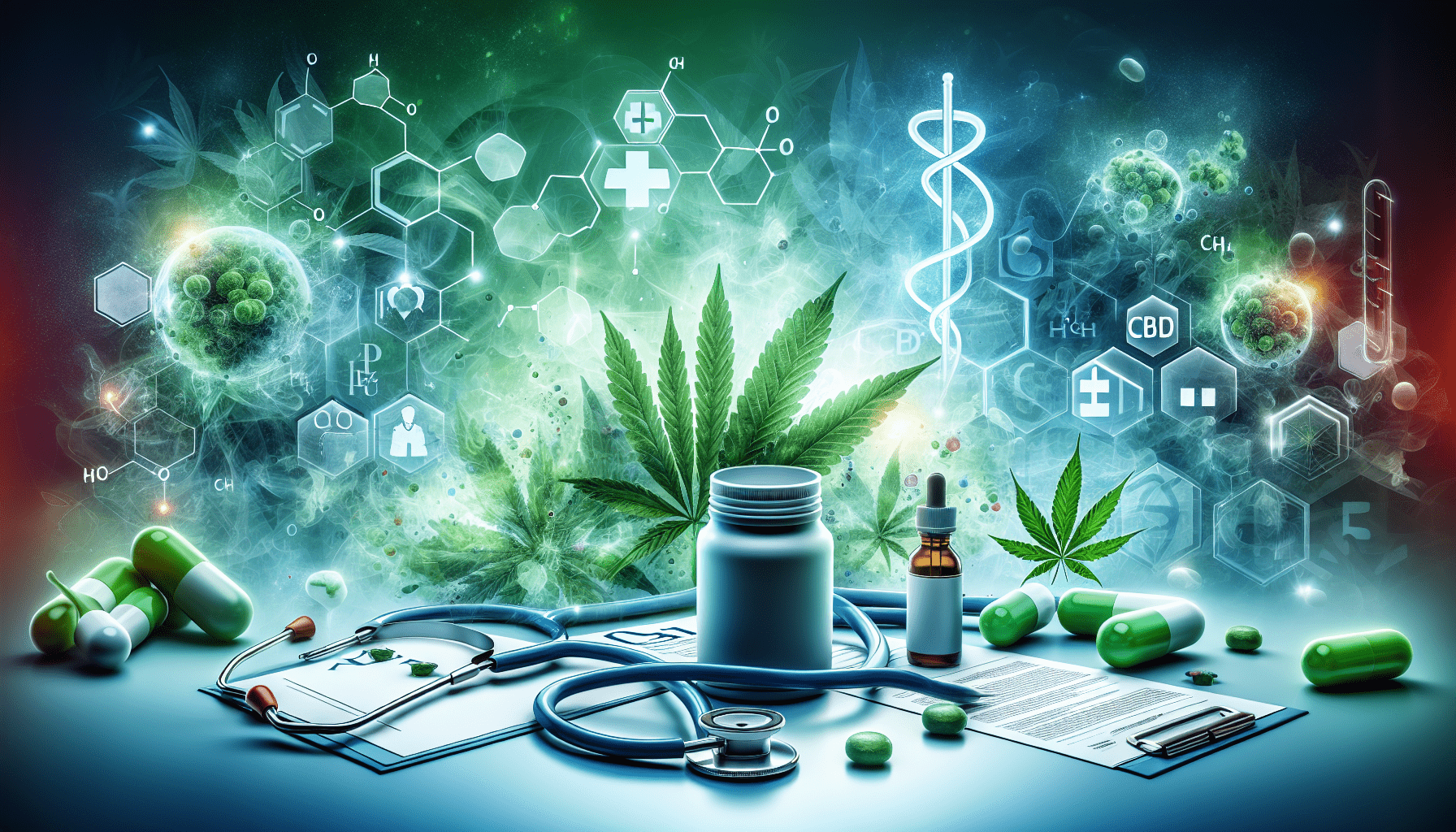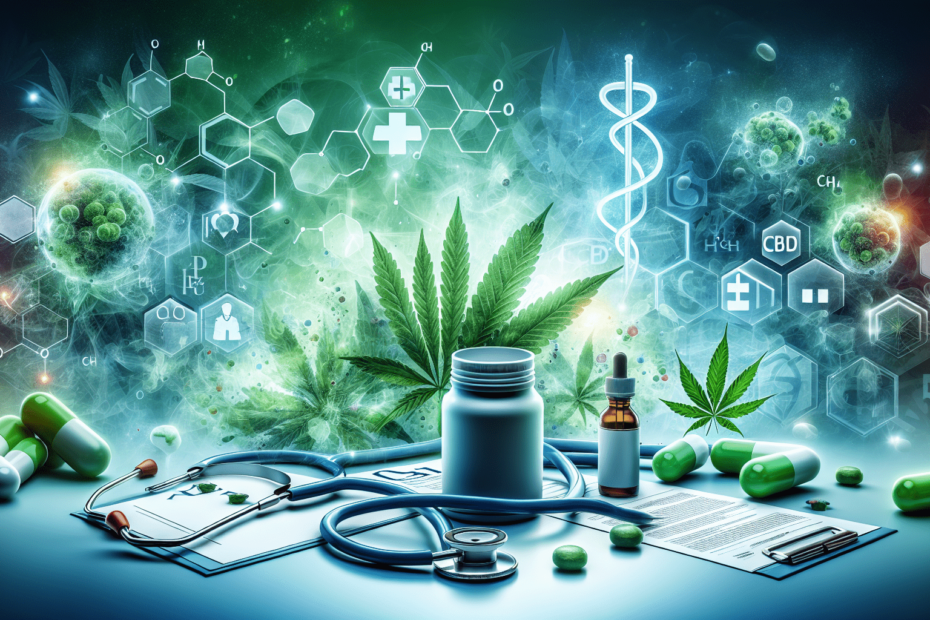Are you curious about the legal status of CBD in medical treatments? With the increasing popularity of CBD as a potential remedy for various health conditions, it’s important to stay informed about its legal standing. Understanding whether CBD is legally accepted for medical use can help you make informed decisions about incorporating it into your treatment plan. In this article, we will explore the current legal status of CBD in medical treatments and provide you with the necessary information you need to know.

Definition of CBD
CBD, short for cannabidiol, is a naturally occurring compound found in the cannabis plant. It is one of over a hundred cannabinoids present in the plant and is known for its therapeutic properties. Unlike THC (tetrahydrocannabinol), another well-known cannabinoid, CBD does not produce the psychoactive effects commonly associated with marijuana use. Instead, CBD is believed to have a variety of potential health benefits, making it an attractive option for medical treatments.
Components and properties of CBD
CBD interacts with the body’s endocannabinoid system, which plays a crucial role in regulating various physiological processes such as pain sensation, mood, and immune response. It does this by binding to specific receptors in the body, mainly the CB1 and CB2 receptors. These receptors are found throughout the central nervous system and immune system, respectively, and are involved in modulating pain, inflammation, and other bodily functions.
CBD has also been found to have antioxidant and anti-inflammatory properties, which may contribute to its potential therapeutic effects. Additionally, CBD has a favorable safety profile, with few reported side effects even at high doses.
Difference between CBD and THC
While CBD and THC are both cannabinoids derived from the cannabis plant, they have distinct properties and effects. The main difference lies in their psychoactive nature. THC is the primary psychoactive compound in cannabis and is responsible for the “high” sensation often associated with marijuana use. In contrast, CBD does not produce the same intoxicating effects.
Furthermore, CBD and THC interact with different receptors in the endocannabinoid system. THC primarily binds to CB1 receptors in the brain, leading to its psychoactive effects, whereas CBD has a weaker affinity for these receptors. Instead, CBD tends to interact with CB2 receptors, which are primarily found in immune cells and peripheral tissues.
Medical uses of CBD
CBD has shown promise in the treatment of various medical conditions. It is commonly used for pain management, with studies suggesting its potential to reduce chronic pain and inflammation. CBD has also demonstrated efficacy as an anti-seizure medication, particularly in the treatment of rare forms of epilepsy such as Dravet syndrome and Lennox-Gastaut syndrome.
Other potential medical uses of CBD include anxiety and depression management, alleviation of nausea and vomiting, and improvement of sleep quality. Preliminary research also suggests that CBD may have neuroprotective properties, which could benefit individuals with neurodegenerative disorders such as Alzheimer’s disease and Parkinson’s disease.
Legal Status of CBD
Federal laws in the United States
The legal status of CBD in the United States is complex, with federal laws often conflicting with state laws. The 2018 Farm Bill legalized the cultivation of hemp, defined as cannabis plants containing less than 0.3% THC. CBD derived from hemp is also considered legal on a federal level, as long as it meets certain criteria.
However, the Food and Drug Administration (FDA) maintains regulatory authority over CBD products intended for therapeutic use. Currently, FDA-approved medications containing CBD, such as Epidiolex for epilepsy, are legal and available by prescription. However, the agency maintains that CBD cannot be marketed as a dietary supplement or added to food products without its approval.
International laws and treaties
CBD’s legal status varies across countries due to differing laws and regulations. In some jurisdictions, CBD is considered a controlled substance, while in others, it is classified as a prescription medication or an over-the-counter supplement. The United Nations’ International Drug Control Conventions, such as the Single Convention on Narcotic Drugs, influence the legal status of CBD in many countries.
Legalization of CBD for medical use
In recent years, there has been a growing recognition of CBD’s potential therapeutic benefits, leading to a push for its legalization for medical use. Many countries have implemented legislation to allow the use of CBD-based medications, typically with specific regulations regarding prescription requirements and product quality.
However, the legalization and regulation of CBD for medical use can vary greatly between jurisdictions, creating inconsistencies that impact patients’ access and healthcare providers’ ability to prescribe and administer CBD-based treatments.
CBD Regulations in Different Countries
Canada
Canada legalized the recreational use of cannabis in 2018 and has a well-established regulatory framework for CBD products. CBD derived from cannabis plants is legal, subject to specific licensing requirements and quality control standards. Health Canada oversees the regulation of CBD products, ensuring their safety and efficacy.
United Kingdom
In the United Kingdom, the legal status of CBD depends on its source and intended use. CBD derived from cannabis is regulated as a controlled substance, while CBD derived from industrial hemp (containing less than 0.2% THC) is not subject to the same restrictions. However, any CBD product marketed for therapeutic purposes must obtain a license from the Medicines and Healthcare products Regulatory Agency (MHRA).
Australia
Australia’s regulations regarding CBD are stringent, mirroring its strict approach to cannabis. CBD is classified as a Schedule 4 substance, requiring a prescription for medical use. The Therapeutic Goods Administration (TGA) oversees the regulation of CBD products, ensuring their safety and quality.
Germany
Germany has one of the most liberal CBD regulations in Europe. CBD products derived from hemp with less than 0.2% THC are legal and widely available. However, any medical claims associated with CBD products must be supported by scientific evidence, and CBD is treated as a novel food ingredient.
FDA’s Stance on CBD
Overview of FDA regulations and guidelines
The FDA has taken a cautious approach to CBD, emphasizing the need for rigorous scientific research to support its safety and effectiveness. The agency has issued warning letters to companies making unsubstantiated health claims about their CBD products and has conducted market surveillance to identify illegal and potentially harmful products.
The FDA is actively exploring regulatory pathways for CBD products, including potential rulemaking for CBD in dietary supplements and the development of an enforcement discretion policy for certain CBD products. Stakeholders, including consumers, healthcare professionals, and industry representatives, have been invited to provide input and feedback regarding the regulation of CBD products.
Approved CBD-based medications
Despite the regulatory challenges, the FDA has approved certain CBD-based medications for specific medical conditions. Epidiolex, an oral solution of CBD, is currently the only FDA-approved CBD product on the market. It is approved for the treatment of seizures associated with Lennox-Gastaut syndrome, Dravet syndrome, and tuberous sclerosis complex.
Ongoing research and clinical trials
The FDA recognizes the need for further scientific research to better understand the potential benefits and risks of CBD. The agency is actively supporting and overseeing clinical trials investigating the use of CBD for various medical conditions, including epilepsy, pain management, and psychiatric disorders. Ongoing research aims to provide a stronger evidence base for healthcare professionals and regulators to make informed decisions regarding CBD’s medical use.

Challenges and Limitations
Conflicting regulations
One of the major challenges surrounding CBD is the conflict between federal and state laws, which leads to inconsistencies in its legal status and regulation. This creates confusion for patients, healthcare providers, and manufacturers alike, hindering the safe and effective use of CBD for medical treatments. Harmonizing legislation and regulations across jurisdictions is essential to ensure patient access and product quality.
Lack of standardized dosage and quality control
The lack of standardized dosage guidelines and quality control standards for CBD products poses a significant challenge. There is a wide variation in CBD concentrations and product formulations, making it difficult for healthcare professionals to determine appropriate dosages for specific conditions. Inadequate quality control measures also raise concerns about product safety and consistency.
Limited access to CBD for patients
Despite the growing recognition of CBD’s potential therapeutic benefits, access to CBD-based treatments remains limited in many jurisdictions. Patients face barriers such as strict prescription requirements, high costs, and limited availability of approved CBD medications. Improved patient access to CBD is crucial for those who could potentially benefit from its use, particularly for those with refractory medical conditions.
Legalization Efforts
Advocacy groups and initiatives
Numerous advocacy groups and initiatives have emerged to promote the legalization and broader access to CBD for medical use. These organizations work to advance research, educate the public and policymakers, and advocate for changes in legislation and regulations. Their efforts aim to foster a better understanding of CBD’s medical potential and improve patient access to safe and effective CBD treatments.
State level legalization in the United States
Several states in the United States have taken steps to legalize and regulate the medical use of CBD independently of federal laws. These states have implemented programs that allow patients to obtain CBD-based treatments with a doctor’s recommendation or prescription. However, state-level regulations can vary, leading to inconsistencies in patient access and product quality.
International recognition of CBD’s medical potential
The World Health Organization (WHO) has recognized the potential therapeutic benefits of CBD and recommended that it be exempted from international drug control conventions. This recognition reflects the growing scientific evidence supporting CBD’s safety and efficacy in certain medical conditions.
Efforts are also underway at the international level to facilitate research and improve access to CBD-based medications. Organizations such as the International Association for Cannabinoid Medicines (IACM) promote evidence-based research, education, and the development of harmonized regulations to enable the safe and effective use of CBD for medical treatments worldwide.

Medical Professionals’ Perspective
Opinions and recommendations from medical associations
Medical associations have differing opinions and recommendations regarding the use of CBD in clinical practice. Some associations, such as the American Medical Association (AMA), support further research and increased access to CBD for medical treatments under appropriate regulatory oversight. However, others express caution and advocate for more robust clinical trials to establish CBD’s safety and efficacy in specific conditions.
Use of CBD in clinical practice
Despite the ongoing debate, many healthcare professionals are incorporating CBD into their clinical practice, particularly in contexts where other treatment options have proven ineffective or have undesirable side effects. CBD is often used to manage chronic pain, certain types of epilepsy, and symptoms associated with anxiety and depression.
However, medical professionals must consider multiple factors when prescribing CBD, including appropriate dosing, potential drug interactions, patient characteristics, and individual medical history. Careful monitoring and follow-up are crucial to ensure optimal patient outcomes and minimize potential risks.
Barriers to prescribing CBD
Medical professionals face various barriers when it comes to prescribing CBD-based treatments. The lack of standardized dosage guidelines and quality control standards mentioned earlier can make it challenging to determine appropriate dosages for specific conditions. Additionally, the legal complexities surrounding CBD can create uncertainty and reluctance among healthcare providers to prescribe CBD, particularly in jurisdictions with stricter regulations.
Patient Experiences
Testimonials and case studies
Numerous patient testimonials and case studies highlight the potential benefits of CBD for medical treatments. These firsthand accounts often emphasize CBD’s ability to alleviate symptoms, improve quality of life, and reduce the need for other medications. While personal experiences can provide valuable insights, it is important to note that individual results may vary, and anecdotal evidence should be complemented with rigorous scientific research.
Effectiveness and side effects of CBD
Clinical studies evaluating CBD’s effectiveness for various medical conditions have produced mixed results. While CBD has shown promise in certain areas, such as epilepsy management and pain relief, further research is needed to establish its efficacy in different patient populations and dosages.
As for side effects, CBD is generally well-tolerated, with most reported adverse effects being mild and transient. Common side effects can include fatigue, changes in appetite, and diarrhea. However, CBD can interact with certain medications, so it is crucial for patients to consult with their healthcare providers before taking CBD.
Legal and financial implications for patients
The legal status of CBD can have significant implications for patients seeking access to CBD-based treatments. In jurisdictions where CBD is heavily regulated or classified as a controlled substance, patients may face legal challenges in obtaining and using CBD. Additionally, the cost of CBD-based treatments and limited insurance coverage can create financial burdens for patients, affecting their ability to access and afford these medications.

Future Outlook
Potential changes in CBD regulations
The legal landscape surrounding CBD is expected to evolve as scientific research and public perception progress. As evidence supporting CBD’s medical benefits accumulates, there is a growing push for clearer and more consistent regulations to facilitate patient access and ensure product quality and safety. Achieving standardization in dosing guidelines and quality control measures will be crucial in maximizing CBD’s therapeutic potential.
Emerging research and innovations
Ongoing research into CBD continues to uncover new potential applications and insights into its mechanism of action. Researchers are exploring the use of CBD in areas such as mental health, neurodegenerative disorders, and cancer treatment. Additionally, advancements in CBD extraction, formulation, and delivery methods are improving the bioavailability and therapeutic efficacy of CBD-based treatments.
Integration of CBD in mainstream medicine
As CBD gains recognition as a potential therapeutic option, its integration into mainstream medicine is becoming more feasible. This integration requires collaboration between healthcare professionals, regulatory bodies, and pharmaceutical companies to establish evidence-based guidelines and ensure the availability of high-quality CBD products. The inclusion of CBD in healthcare protocols has the potential to enhance patient outcomes and expand treatment options.
Conclusion
In summary, the legal status of CBD in medical treatments remains a complex and evolving issue. While CBD shows promise for a variety of medical conditions, its legal and regulatory status varies significantly across jurisdictions. Achieving a balance between patient access and safety is paramount, and evidence-based research is crucial to inform decision-making regarding CBD’s use in medical treatments. As scientific understanding and regulations continue to advance, CBD has the potential to revolutionize healthcare and improve the lives of many individuals worldwide.

